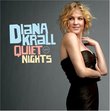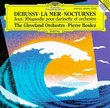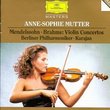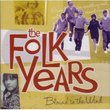| All Artists: Roger Sessions, Francis Thorne, Paul Lustig Dunkel, Westchester Philharmonic Orchestra, Robert Taub, Ursula Oppens Title: Francis Thorne: Piano Concerto No. 3; Roger Sessions: Concerto for Piano and Orchestra Members Wishing: 0 Total Copies: 0 Label: New World Records Release Date: 8/2/1994 Genre: Classical Styles: Forms & Genres, Concertos, Instruments, Keyboard, Symphonies Number of Discs: 1 SwapaCD Credits: 1 UPC: 093228044321 |
Search - Roger Sessions, Francis Thorne, Paul Lustig Dunkel :: Francis Thorne: Piano Concerto No. 3; Roger Sessions: Concerto for Piano and Orchestra
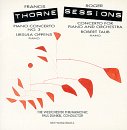 | Roger Sessions, Francis Thorne, Paul Lustig Dunkel Francis Thorne: Piano Concerto No. 3; Roger Sessions: Concerto for Piano and Orchestra Genre: Classical
|
Larger Image |
CD DetailsSimilar CDsSimilarly Requested CDs
|
CD ReviewsSchoenberg's Second Piano Concerto Discophage | France | 11/29/2007 (4 out of 5 stars) "Reviewing his symphonies #3 to 9, his Rhapsody and Concerto for Orchestra (see Roger Sessions: Symphonies Nos. 1, 2, 3, Roger Sessions: Symphony No. 4; Symphony No. 5; Rhapsody, Roger Sessions: Symphonies 6, 7 & 9 and Symphony 8 / Concerto for Orchestra), I commented that Sessions had composed the symphonies Schoenberg never wrote. This wasn't meant to be disparaging: in these compositions the follower is not inferior to his model, and after all Schoenberg did NOT write these symphonies, so I am grateful to Sessions for having obliged.
The same comment can be made of the Piano Concerto from 1955-6), which comes immediately before the Third Symphony. You have the the busy contrapuntal orchestral activity, the gnarled atonal melodic motifs, the violins playing unisono angular lines in their upper registers, the sense of drama conveyed by the muscularity of utterance and the rhythmic bite, sometimes to the point of squareness. That said, it took me longer to warm up to the Piano Concerto than to the Symphonies, and I am not quite sure why. Maybe it is that the moments of lyricism, as atonaly stern as they are in the symphonies, aren't as much in evidence here, possibly because of the relative greyness of color and angularity of touch that the piano medium convenys. Or maybe it is just that we already have a Piano Concerto by Schoenberg, so another one didn't seem as usefull as with the symphonies. I also found, especially in the first movement, that Sessions proceeded a little too much in fits and starts: I had the feeling that the moments of tension hardly had time to really develop before they petered out, giving way to moments of repose. Still, on repeated listenings, it is quite an impressive composition, but also a somewhat forbidding and unseductive one, demanding on the listener and not yielding its secrets and beauties all at once. It is incredible (and saddening) to note that, half-a-century after its inception, this is its first and until now only recording. Some of the same paramesters are at play in Francis Thorne's Concerto: the motoric muscularity and rhythmic bite, the rich contrapuntal orchestration, the atonal dissonance, the busy pianistic activity, even the whimsicality which springs at times. But some of Thorne's rhythmic bite points more to Bernstein Jazz than to Schoenberg, and his lyricism is of a more heart-on-sleeve kind which I find somewhat trite, pointing to the "prairie-style" of Copland, Harris and Thomson, when not to Hollywood film music. Excellent notes, TT way too short (44:34). " |

 Track Listings (6) - Disc #1
Track Listings (6) - Disc #1
